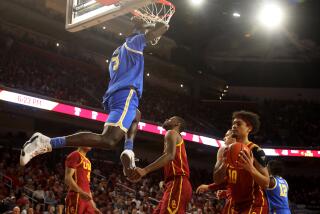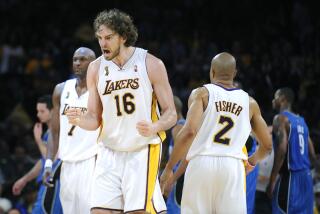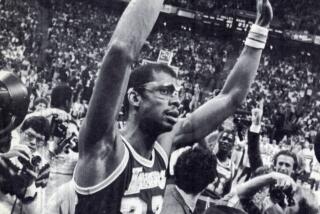He Shows He Can Hit the Jumper
- Share via
About five years ago, the backcourt players in the National Basketball Assn. got a lousy break: Danny Ainge couldn’t hit the curveball.
If he could have, Danny might be playing shortstop for the Toronto Blue Jays. To a man, every defensive player in the NBA wishes he were. Instead, he’s playing off guard for the Boston Celtics.
It’s not that Danny Ainge is Larry Bird. Or Magic Johnson. Or even Dennis Johnson. What Danny is, is a pest. He’s like a fighter who fights you three minutes of every round and throws punches, a salesman who won’t give up. If you don’t feel like playing on a given night, Danny Ainge is the last guy you want to see walk on the court opposite you.
Danny is so good on the basketball court, it’s interesting to speculate on whether Danny couldn’t hit the curveball--or didn’t want to.
Danny was in somewhat the same fix as the guy whose family wants him to marry the girl next door who bakes cakes and does embroidery, only he keeps dreaming about the belly dancer who lives on the other side of the tracks.
Ainge got signed to a baseball contract right out of high school. For a six-figure bonus. Danny knew it was the sensible sport for him to choose. You last longer. The pay is steadier. The climate is nicer.
The trouble was, Danny blossomed as a basketball player at Brigham Young. He was not only an All-American, good enough to lead his team to the doorstep of the Final Four, he was given the coveted John Wooden Award, emblematic of the country’s best collegiate basketball player in 1981. Ironically, Danny couldn’t collect the award, he was in spring training with the Blue Jays.
The inability to solve major league pitching was probably a bigger break for Danny Ainge than it was for the league’s pitchers. He hit .237, .243, and .187 in his three-year stint. The decimals of baseball being what they are, probably a mere handful of hits (in 1980, 10 more hits would have had him batting .301 instead of .243) would have kept him in a big league uniform. Danny Ainge should probably send flowers on St. Valentine’s Day to the likes of Ron Guidry, Jim Palmer, Jack Morris. They did more to persuade him to turn to basketball than the Celtics’ Red Auerbach.
There is little doubt Danny Ainge is in the right sport today. Danny admitted as he sat in a locker room at the Forum after a Laker-Celtic game the other day that he may have subconsciously wished to fail.
“I don’t know that I gave baseball my best shot,” he said. “Basically, my love was basketball. I knew a baseball career probably lasts longer than one that has you pounding up a hardwood floor every 24 seconds, but my heart was in basketball.”
A lot of people wondered what the Celtics wanted with a banjo-hitting utility infielder, but Danny Ainge has fit right in with a Celtics’ tradition of determined, hard-working, long-shooting guards, a worthy successor to the Bob Cousys, Frank Ramseys, K.C. Joneses, Sam Joneses, Bill Sharmans or Jo Jo Whites.
“He is an ‘effort’ player,” Laker Coach Pat Riley says. “If you don’t play him with effort yourself, he’ll kill you. He’s the prototype of the work ethic. If you don’t come ready to play, he’ll make a monkey of you. Show you up. It’s not that he doesn’t have talent, he does. But it’s the fact there is no better competitor in the game that shines through.”
“He is always around the ball,” says Laker guard Michael Cooper, no stranger to the work ethic himself. “I played him a lot in college and now in the pros, and you think you know him and he will still surprise you. He is like one of those gnats you hear buzzing around when you are sitting on the front porch. You think you’ve got them--wham!--you bring down the magazine. And then, all of a sudden, you hear this buzzing again. And it’s Ainge.”
Says Laker Byron Scott: “You can’t take your eyes off him. You have to be on your toes every minute. He’ll back-door you, he’ll throw in a three-pointer if you leave him unattended. He’s always moving, he’s never still.”
“He’s still like a utility infielder,” says Celtic Coach K.C. Jones. “You can put him in spots, he can start or come off the bench, you know you’re going to get 35 minutes of all-out basketball from him.”
“He’s a smart player,” offers Magic Johnson. “He doesn’t give you anything, everything you get you have to work for with Ainge, he’s no night off. He’s smart. He seems to know where to be and when to be there. Lots of guys play spirited defense in this league, but it’s not always smart defense. With Danny Ainge, it is. You have to think and play. He makes what he does count.”
All in all, Danny Ainge would seem to be right where he ought to be--in a sport where the competition wishes to heaven he could have hit major league pitching instead of one where they were glad he couldn’t and sorry to see him go.
More to Read
Go beyond the scoreboard
Get the latest on L.A.'s teams in the daily Sports Report newsletter.
You may occasionally receive promotional content from the Los Angeles Times.










